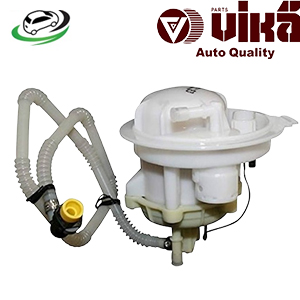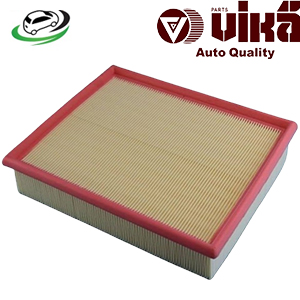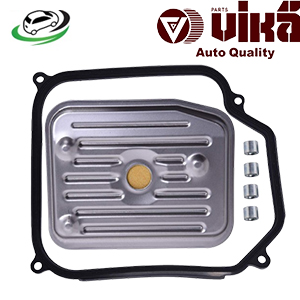-17%
Get VW Golf III VR6 12v/ Golf IV 1.8T/ Jetta III VR6 12v/ Jetta IV Automatic Transmission Filter 01M325429
The automatic transmission filter is a critical component in an automatic transmission system, designed to keep the transmission fluid clean and free of contaminants. This fluid plays a vital role in the operation of an automatic transmission, and the filter ensures that it remains effective in lubricating and cooling the transmission components. Understanding the functions, importance, maintenance practices, and common issues associated with automatic transmission filters is essential for vehicle owners and automotive professionals alike.
Functions of the Automatic Transmission Filter
- Contaminant Removal: The primary function of the automatic transmission filter is to remove contaminants from the transmission fluid. As the fluid circulates through the system, it can pick up dirt, metal shavings, and other impurities that can damage transmission components.
- Maintaining Fluid Quality: By filtering out particles and debris, the transmission filter helps maintain the quality of the fluid. Clean fluid is essential for optimal transmission performance, as it ensures proper lubrication and cooling of the transmission parts.
- Protecting Transmission Components: The filter acts as a protective barrier, preventing harmful contaminants from reaching sensitive components such as gears, clutches, and valves. This protection is crucial for preventing premature wear and failure of the transmission.
- Promoting Efficient Operation: A clean transmission filter allows for smooth and efficient fluid flow, which is vital for the transmission’s proper functioning. If the filter becomes clogged, it can restrict fluid flow, leading to shifting problems and reduced performance.
- Supporting Longevity: Regular maintenance of the transmission filter contributes to the overall longevity of the transmission system. By ensuring that contaminants are removed, the filter helps prevent costly repairs and extends the life of the transmission.
Importance of the Automatic Transmission Filter
- Transmission Performance: A properly functioning transmission filter is vital for optimal transmission performance. A clogged or damaged filter can lead to slipping, rough shifting, and other performance issues that can affect drivability.
- Preventing Transmission Damage: Contaminants in the transmission fluid can cause significant damage to transmission components, including gears and clutches. The filter serves as a first line of defense, preventing these contaminants from causing harm.
- Extending Fluid Life: By keeping the transmission fluid clean, the filter helps extend the fluid’s lifespan. Clean fluid is less likely to break down or degrade, which can save vehicle owners from costly fluid changes and repairs.
- Improving Fuel Efficiency: A clean transmission filter promotes better fluid flow and transmission efficiency, which can result in improved fuel economy. A well-maintained transmission can operate more efficiently, translating to lower fuel costs.
- Cost-Effectiveness: Regular replacement of the automatic transmission filter can prevent more significant issues down the line, such as transmission failure or extensive repairs. This proactive maintenance is cost-effective and can save vehicle owners from expensive fixes.
Types of Automatic Transmission Filters
- Screen Filters: These filters use a mesh screen to trap larger particles and debris. They are often used in conjunction with a secondary filter or as part of the transmission pan.
- Cartridge Filters: Cartridge filters are replaceable filters that come in a canister design. They are commonly found in many modern automatic transmissions and can filter out smaller particles effectively.
- Integrated Filters: Some transmission systems feature integrated filters that are built into the transmission pan. These filters are designed to last the life of the transmission, but may require replacement if the pan is serviced.
- Magnetic Filters: Magnetic filters use magnets to attract and capture metal shavings and debris that can accumulate in the transmission fluid. These filters are often used in conjunction with other types of filters for added protection.
Maintenance of the Automatic Transmission Filter
- Regular Inspections: Routine inspections of the automatic transmission filter should be part of regular vehicle maintenance. Look for signs of leaks, damage, or clogging that may indicate a need for replacement.
- Follow Manufacturer’s Recommendations: Adhere to the manufacturer’s guidelines for filter replacement intervals. Typically, the filter should be replaced every 30,000 to 60,000 miles, but this can vary depending on the vehicle and driving conditions.
- Change Transmission Fluid: Along with replacing the filter, it’s essential to change the transmission fluid at recommended intervals. This practice ensures that the fluid remains clean and effective in lubricating the transmission.
- Monitor Transmission Performance: Pay attention to any changes in transmission performance, such as slipping, delayed shifting, or unusual noises. These symptoms may indicate a clogged or failing filter.
- Inspect Transmission Pan: When servicing the transmission filter, inspect the transmission pan for debris and contamination. Cleaning the pan can help ensure that the filter operates effectively.
- Use Quality Replacement Parts: When replacing the transmission filter, always use high-quality replacement parts that meet or exceed manufacturer specifications. Using inferior parts can lead to premature failure and performance issues.
Common Issues Associated with Automatic Transmission Filters
- Clogged Filter: A clogged automatic transmission filter is one of the most common issues. Symptoms of a clogged filter include slipping, rough shifting, and overheating. A clogged filter can restrict fluid flow, leading to performance problems.
- Leaking Filter: A damaged or improperly installed filter can result in fluid leaks. Transmission fluid leaks pose a risk of damage to the transmission and should be addressed immediately to prevent further issues.
- Filter Contamination: If the filter becomes saturated with contaminants, it may no longer be able to effectively filter the fluid. This contamination can lead to reduced fluid quality and increased wear on transmission components.
- Incorrect Installation: Improper installation of the filter can lead to fluid leaks or inadequate filtration. It’s essential to follow manufacturer guidelines and torque specifications when installing the filter.
- Fluid Degradation: Over time, transmission fluid can degrade due to heat and contamination. A worn or clogged filter can contribute to fluid breakdown, leading to decreased performance and potential damage.
- Filter Material Failure: The material of the filter can degrade over time, leading to reduced filtration effectiveness. Regular inspections and timely replacement are essential to prevent this issue.
Conclusion
The automatic transmission filter is a vital component of an automatic transmission system, responsible for removing contaminants and maintaining the quality of the transmission fluid. Its functions include contaminant removal, protecting transmission components, promoting efficient operation, and extending the lifespan of the transmission.
Regular maintenance and timely replacement of a worn or damaged transmission filter are crucial for preventing common issues such as clogging, leaks, and performance problems. Understanding the importance of the automatic transmission filter and monitoring its condition can save vehicle owners from costly repairs and enhance the longevity of the transmission.
Investing time in the maintenance of the automatic transmission filter is essential for achieving reliable transmission performance and preventing severe damage. A properly functioning filter not only contributes to efficient operation but also plays a significant role in ensuring the vehicle’s overall safety and reliability. By understanding how the transmission filter works and its importance in the transmission system, vehicle owners can take proactive measures to maintain their vehicles and enjoy optimal performance for years to come.
Follow us on Facebook for more parts.




Reviews
Clear filtersThere are no reviews yet.